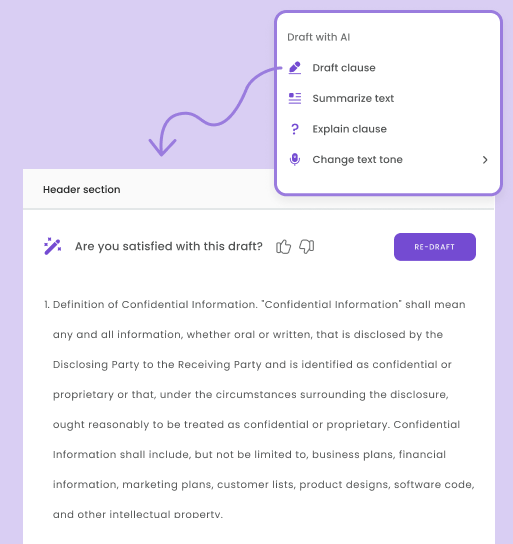When you create contracts a lot, it’s important to have consistent language among your documents. There are two options – do it all yourself – or set up a clause library.
The second option is usually more attractive.
In this guide, you’ll learn what a clause library is, its main purpose, the types of clauses used in clause libraries, and how to properly create your clause library.
What Is a Clause Library?
A clause library is a collection of standardized and pre-approved contract clauses, terms, and provisions that can be used in legal and contractual documents. These clauses are drafted, reviewed, and approved by legal experts within an organization or industry to ensure accuracy, compliance, and consistency in contracts.
Clauses are the building blocks of legal and contractual documents. They define the rights, obligations, responsibilities, and terms of the parties involved. Clauses cover various aspects of a contract, including pricing, delivery, warranties, dispute resolution, termination, consideration, and more. A well-structured and comprehensive clause library ensures that contracts are drafted efficiently and accurately, reducing the risk of legal disputes and enhancing contract management.
A clause library is a valuable resource for organizations, legal departments, and contract professionals. It simplifies contract drafting, ensures consistency and compliance, and enhances efficiency in contract management. By providing a standardized and reliable source of contract clauses, organizations can reduce legal risks, streamline processes, and improve overall contract management practices.
Types of Clauses in a Clause Library
- Force Majeure Clauses:
- Definition: These clauses outline what happens if unforeseeable events or circumstances beyond the control of the parties (such as natural disasters, war, or pandemics) disrupt the ability to perform under the contract.
- Purpose: Force majeure clauses allocate risk and may provide relief from contractual obligations when extraordinary events occur.
- Payment and Pricing Clauses:
- Definition: These clauses detail payment terms, schedules, and methods, as well as pricing structures. They specify how and when payments should be made, including any applicable late fees or interest rates.
- Purpose: Payment and pricing clauses establish the financial aspects of the contract and help ensure that parties are compensated appropriately.
- Termination and Dispute Resolution Clauses:
- Definition: Termination clauses specify the conditions under which the contract can be terminated, while dispute resolution clauses outline the process for resolving disagreements or legal disputes between the parties.
- Purpose: These clauses provide a framework for addressing contract disputes and, in some cases, allow for the orderly termination of the agreement.
- Confidentiality and Non-Disclosure Clauses:
- Definition: These clauses establish obligations related to the protection of confidential information shared between the parties. They often include provisions related to the use, disclosure, and duration of confidentiality obligations.
- Purpose: Confidentiality clauses safeguard sensitive information and trade secrets, promoting trust and security in business relationships.
Customizable and Industry-Specific Clauses
- Tailoring Clauses to Specific Business Needs:
- Customization: You can customize clauses to address your unique business requirements and preferences. For example, they may include specific delivery terms, performance metrics, or indemnification provisions.
- Purpose: Customizable clauses allow you to align contracts with their specific objectives, industry practices, and risk tolerance.
- Industry Standards and Regulations Affecting Clause Content:
- Industry-Specific Clauses: Some industries have standard clauses that address unique aspects of their operations. For instance, construction contracts may include clauses related to change orders, progress payments, and lien releases.
- Regulatory Compliance: Certain industries, such as healthcare or finance, must adhere to strict regulatory requirements. Clause libraries in these sectors may include provisions to ensure compliance with laws like the Health Insurance Portability and Accountability Act (HIPAA) or the Dodd-Frank Act.
Clause libraries contain a range of common clauses that address fundamental aspects of contracts, such as force majeure, payment, termination, and confidentiality. However, these libraries are also flexible, allowing you to customize clauses to suit your needs. Furthermore, industries with specialized regulations and practices may include industry-specific clauses to ensure compliance and alignment with sector standards. Clause libraries serve as valuable resources for efficient contract drafting.
Building and Maintaining a Clause Library
- Identifying Frequently Used Clauses:
Begin by identifying the most frequently used clauses in your organization’s contracts. These are typically the standard, boilerplate provisions that appear across various contracts.
- Organizing Clauses for Easy Access:
Create a systematic organization structure for the clause library. Group clauses into categories or folders based on their function (e.g., payment terms, termination, confidentiality). This structure makes it easier for users to locate the relevant clauses.
- Documenting Clause Variations and Versions:
Recognize that some clauses may have variations based on factors such as jurisdiction, industry, or specific contract requirements. Document these variations and versions clearly in the library, and provide guidance on when to use each version.
Legal Review and Approval
- Ensuring Clauses Are Legally Sound and Compliant:
Before adding or updating clauses in the library, conduct a thorough legal review to ensure that they are legally sound and compliant with relevant laws and regulations. This review should encompass both general contract law principles and any industry-specific regulations.
- Involvement of Legal Professionals in Library Maintenance:
Engage legal professionals (e.g., in-house counsel or external legal advisors) in the ongoing maintenance of the clause library. They can provide expertise in identifying changes in legal requirements, industry standards, or emerging risks that may necessitate updates to existing clauses or the addition of new ones.
Maintaining a robust and effective clause library is an ongoing process. Regularly review and update the library to keep it current with legal changes, industry best practices, and the evolving needs of your organization. Additionally, consider the following practices:
- Version Control: Maintain version control for clauses to track changes and ensure that the latest versions are always available for use.
- Training: Provide training to contract drafters and users on how to effectively navigate and use the clause library. Ensure they understand the significance of using approved clauses.
- Feedback Mechanism: Establish a feedback mechanism that allows users to report issues or suggest improvements to clauses in the library. This can help enhance the library’s quality over time.
- Regular Audits: Conduct periodic audits of contracts to assess whether the clauses used align with those in the library. Address any deviations or discrepancies.
- Integration with Contract Management Software: If applicable, integrate the clause library with contract management software to streamline contract creation and management processes.
Benefits of a Digital Clause Library
- Easy Accessibility and Searchability:
- Efficient Retrieval: Digital clause libraries are easily accessible to authorized users from various locations. This accessibility eliminates the need to physically search through paper documents or scroll through lengthy contracts.
- Search Functionality: Users can quickly search for specific clauses or keywords within the library, saving time and ensuring that the most relevant clauses are readily available.
- Version Control and Updates:
- Version Tracking: Digital libraries provide robust version control capabilities, allowing users to track changes made to clauses over time. This ensures that the most recent and approved versions are always in use.
- Real-Time Updates: Updates to clauses can be made in real-time, ensuring that changes in laws, regulations, or industry standards are promptly reflected in the library.
- Collaboration Features for Teams:
- Collaborative Editing: Digital clause libraries often come with collaboration features that enable multiple team members to collaborate on clause creation, review, and updates in real-time, even if they are geographically dispersed.
- Commenting and Approval Workflows: Teams can utilize features like commenting and approval workflows to streamline the process of reviewing and approving clauses, ensuring alignment with legal and compliance requirements.
Clause Library Best Practices
- Regular Review and Updates:
Schedule regular reviews of the clause library to ensure that its content remains up-to-date and relevant. Consider conducting these reviews quarterly or annually, depending on the frequency of legal and regulatory changes in your industry.
- Training and Awareness Among Stakeholders:
Provide training to individuals who use the clause library, including contract drafters, legal teams, and procurement staff. Ensure that they understand how to navigate the library, select appropriate clauses, and comply with established processes.
Avoiding Common Pitfalls
- Inadequate Organization and Categorization:
Organize the clause library in a logical and user-friendly manner, with clear categories and subcategories for different types of clauses. Avoid clutter and ensure that users can easily find the clauses they need. Consider using a standardized naming convention for clauses to enhance searchability.
- Failure to Maintain Legal Compliance:
Stay vigilant about legal compliance. Regularly review and update clauses to reflect changes in laws, regulations, and industry standards. Engage legal professionals to conduct legal reviews and ensure that clauses are legally sound and compliant.
By implementing these best practices and avoiding common pitfalls, you can effectively manage their clause libraries, leading to improved contract drafting efficiency, reduced legal risks, and enhanced compliance with legal and regulatory requirements.
Conclusion
Clause libraries are powerful tools for you and your organization when you create many contracts with a wide range of customers, vendors, and partners. It increases efficiency and ensures that you’re delivering compliant contracts in all of your contracts.
This guide has highlighted many of the benefits, pitfalls, and strategies to ensure your clause library is effective. Follow the steps outlined in this guide to create your own clause library with minimal mistakes.
Take advantage of DoxFlowy to automate contracts that have been created with your standardized clauses to further streamline and automate your contract processes.




